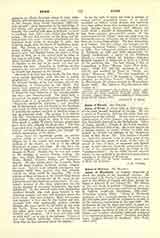

Adam of Fulda, b. about 1450, d. after 1537, one of the most learned musicians of his age. He was a monk of Franconia, deriving his name from the capital city of that country. At that time the contrapuntal music, of which Josquin was such a brilliant star, flourished above all in the Netherlands. Adam of Fulda, himself a disciple of the Dutch teachers, ultimately became their rival. He is best known for a famous treatise on music, written in 1490, and printed by Gerbert von Hornan, in his “Scriptores eccles. de Mus. Sacra”, III. This treatise is divided into forty-five chapters, some of which treat of the invention and the praise of music, of the voice, of sound, of tone, of keys, of measured and figured music, of tone relations, intervals, consonances, etc. A list of his compositions may be found in the “Quellen-Lexikon”. As he called himself musicus ducalis, he was probably in the service of some prince, possibly of the Bishop of Wurzburg.
J. A. VOLKER

